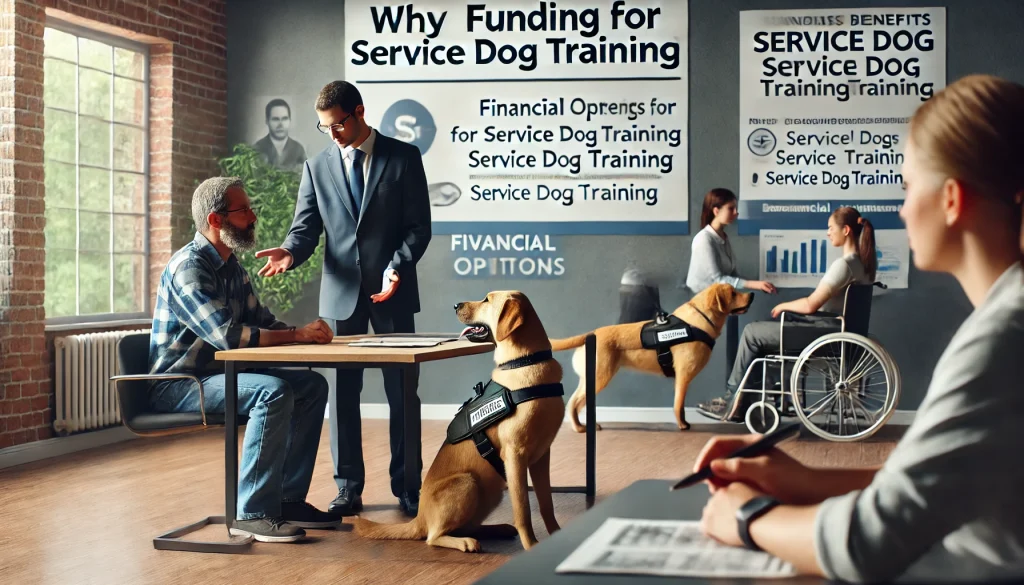Training a service dog can be an expensive endeavor, but it is essential for individuals with disabilities who rely on these animals for assistance. In this blog post, we will explore various funding options for service dog training, helping you find the financial assistance you need. Understanding these funding sources can make the journey to obtaining a service dog more accessible and less stressful. Let’s dive into the different funding sources for service dog programs and how they can help you achieve your goal.

Why Funding is Important
The High Cost of Training
Training a service dog is a significant investment. The cost can range from $15,000 to $50,000 or more, depending on the training requirements and the dog’s specific tasks. This high cost includes the dog’s selection, training, veterinary care, and other associated expenses. Many individuals and families may find it challenging to cover these costs out-of-pocket.
Benefits of Funding
Securing financial assistance for service dogs can alleviate the financial burden and make the process more feasible. It allows individuals to focus on the benefits of having a service dog without the stress of financing the training. Additionally, having access to funding ensures that the dog receives the best possible training and care.
Service Dog Training Funding Options
Nonprofit Organizations
Many nonprofit organizations offer financial assistance for service dogs. These organizations often have grants, scholarships, and sponsorship programs to help cover training costs. Some well-known nonprofits include:
Canine Companions for Independence
Canine Companions for Independence provides highly trained assistance dogs to people with disabilities at no cost. They rely on donations and fundraising to cover the training expenses.
The Assistance Dog United Campaign (ADUC)
ADUC offers grants to individuals needing financial assistance for service dog training. Their funding sources come from donations and fundraising events.
Government Programs
Certain government programs provide financial assistance for service dogs. These programs are typically available to veterans and individuals with specific disabilities.
Veterans Affairs (VA) Benefits
The VA offers service dog benefits to veterans with disabilities. This includes covering the cost of training and veterinary care. Veterans can apply for these benefits through their local VA office.
Social Security Disability Insurance (SSDI)
SSDI beneficiaries may be eligible for financial assistance to cover some of the costs associated with service dogs. While SSDI doesn’t directly cover the cost, it can provide supplemental income to help with expenses.
Crowdfunding
Crowdfunding has become a popular way to raise funds for various causes, including service dog training. Platforms like GoFundMe and Kickstarter allow individuals to share their story and solicit donations from friends, family, and the broader community.
Personal Loans and Savings
Some individuals may choose to take out personal loans or use their savings to cover the cost of service dog training. While this option involves more financial risk, it can provide the necessary funds quickly.
Employer Assistance Programs
Certain employers offer assistance programs that include financial support for service dogs. These programs may provide grants or reimbursements for training expenses.

Understanding Financial Assistance for Service Dogs
Grants and Scholarships
Grants and scholarships are financial awards that do not need to be repaid. Many organizations and foundations offer these to individuals needing financial help for service dog training. Researching and applying for these opportunities can significantly reduce out-of-pocket costs.
Fundraising Events
Organizing or participating in fundraising events can also help cover training costs. Events like charity runs, bake sales, and community fairs can raise significant funds and raise awareness about the importance of service dogs.
Partnerships with Local Businesses
Local businesses may be willing to sponsor service dog training programs or provide donations. Building partnerships with these businesses can be a valuable source of funding.
Finding Funding Sources for Service Dog Programs
Networking
Connecting with others in the service dog community can provide valuable insights into funding opportunities. Joining support groups, attending events, and engaging with online forums can help you discover new funding sources.
Applying for Multiple Programs
Applying for multiple funding programs increases your chances of securing the necessary funds. Be diligent in researching and applying to various grants, scholarships, and other financial assistance programs.
Importance of Pet Insurance and Service Dog Products
Ensuring Health and Well-being
Pet insurance is crucial for maintaining the health of a service dog. It helps cover veterinary expenses, ensuring that the dog remains healthy and able to perform its duties. Regular check-ups, vaccinations, and emergency care can be costly, and pet insurance provides peace of mind.
Quality Service Dog Products
Investing in quality service dog products, such as vests, harnesses, and leashes, enhances the dog’s ability to assist its handler. These products ensure the dog is comfortable and easily identifiable as a service animal.
Self-Training Options
Benefits of Self-Training
Self-training a service dog can be a more affordable option and allows for a stronger bond between the handler and the dog. It also provides flexibility in training methods and schedules.
Resources for Self-Training
Websites like ServiceDogOwners.com offer resources and guides for individuals interested in self-training their service dog. These resources include step-by-step instructions, training tips, and support from experienced trainers.
Conclusion
Securing funding for service dog training is a critical step in obtaining a service dog. By exploring various funding sources, including nonprofit organizations, government programs, crowdfunding, and personal savings, you can find the financial assistance needed to cover training costs. Understanding these options and being proactive in applying for multiple programs can make the journey to obtaining a service dog more accessible.
Investing in pet insurance and quality service dog products ensures your service dog remains healthy and effective. Whether you choose professional training or self-training, these dogs become invaluable partners in managing disabilities and improving quality of life.
Discover the various funding options available and start your journey toward obtaining a service dog today. The right financial assistance can make all the difference in achieving your goal of having a well-trained, supportive service dog by your side.
Searching for a way to boost your income while keeping your service dog by your side? Learn how to launch a Side Hustle or new career and increase your earnings alongside your loyal companion. Click Here to find out more and start your journey today!






